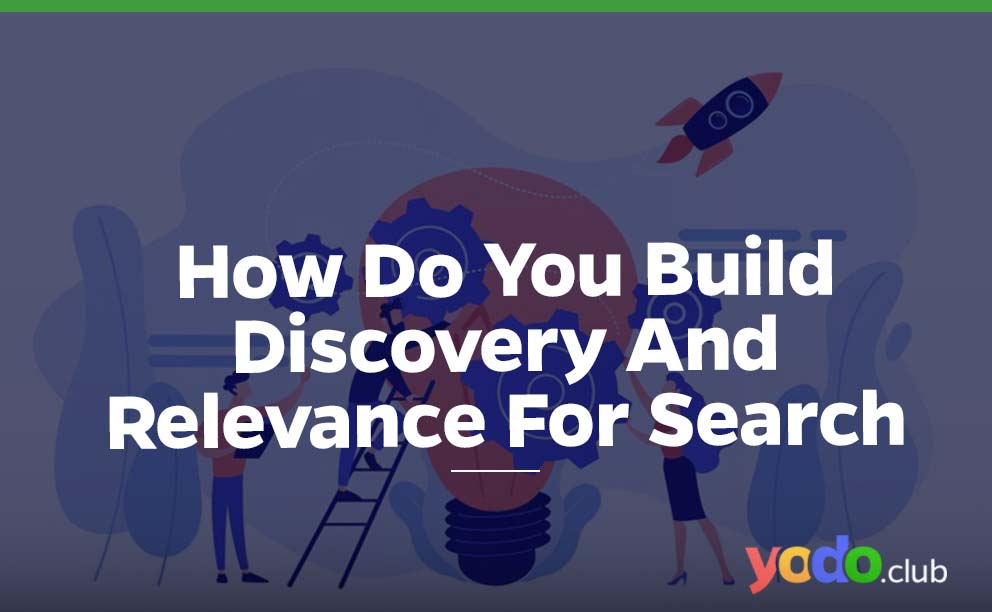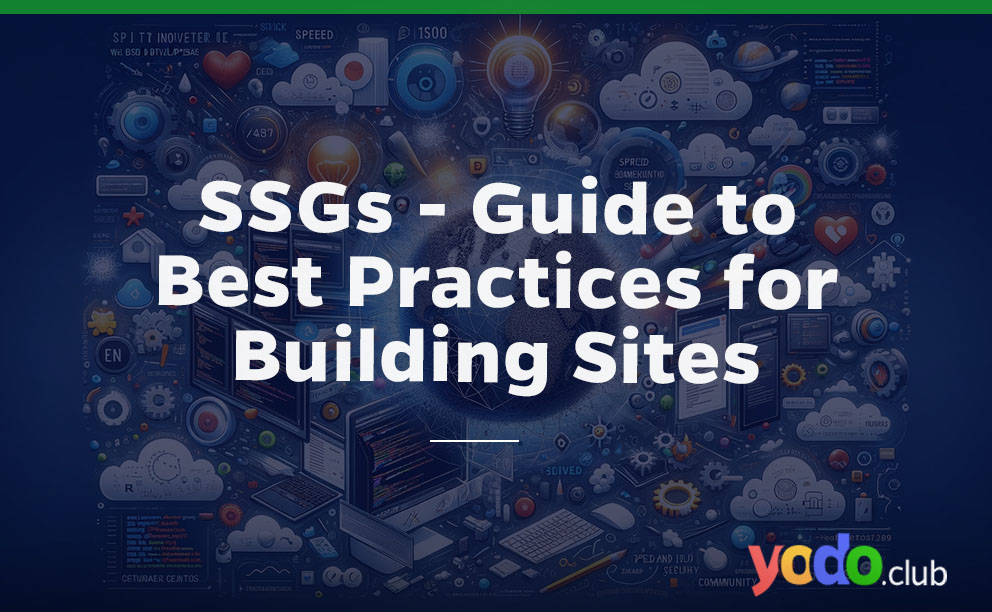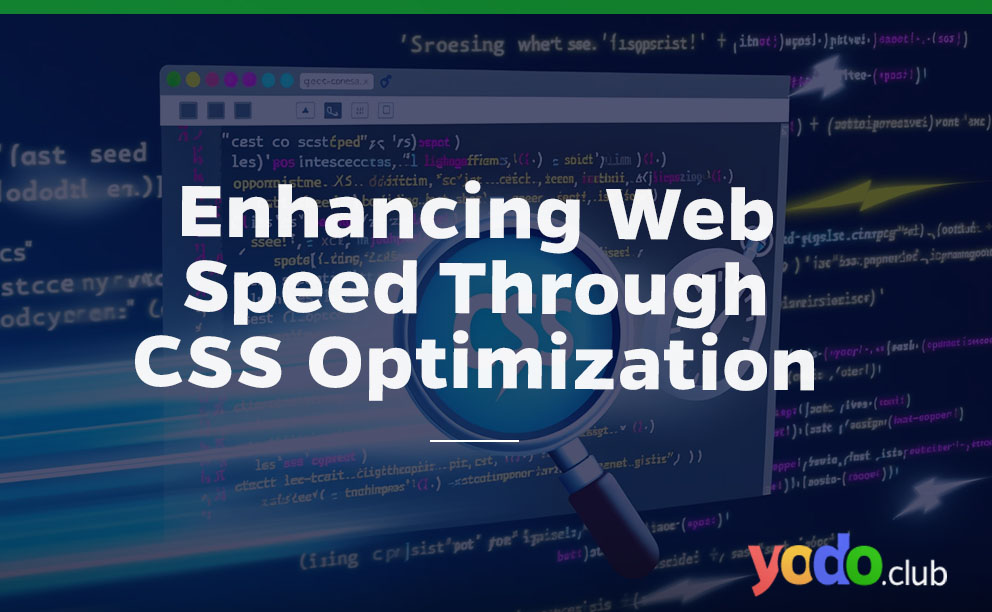In this digital landscape, SEO is more dynamic and crucial than ever, and it plays a pivotal role in ensuring that your online content is not lost in the vast sea of the internet.
Search Engine Optimization is a practice that’s constantly adapting to the ever-changing algorithms and user behaviors of major search engines like Google, Bing, and Yahoo. It’s a multifaceted strategy that website owners, businesses, and content creators employ to improve their online visibility, reach a wider audience, and ultimately, provide valuable information and solutions to users.
Therefore, understanding how to build discovery and relevance for search engines is like mastering the art of being found in the crowd.
Unlock the secrets of how to build discovery and relevance for search engines. Learn the essential factors for enhancing your online visibility and engaging with your audience.

Table of Contents
How Do You Build Discovery And Relevance For Search Engines
The answer to this question is simple: all of these factors significantly affect your SEO strategy. Your SEO journey is a holistic effort, and various elements work together to ensure your content is discovered and considered relevant by search engines. Let’s briefly touch on each of these influencing factors:
Content Quality: The Foundation of SEO Success
High-quality content is the lifeblood of your SEO strategy. It forms the cornerstone of what search engines value most. Creating content that is not only well-researched and well-written but also informative and engaging is paramount. This content not only satisfies the needs of users but also garners attention from search engine algorithms, positioning your pages as valuable resources.
Target Keywords For Relevancy
Keywords serve as the essential bridges connecting users to your content. Effective keyword research and utilization are vital in this journey. The art of choosing the right keywords, those that resonate with your audience’s intent, and seamlessly integrating them into your content can significantly enhance your visibility in search results. Keywords are the signposts that guide users to the information they seek.

User Experience: Prioritizing People Over Algorithms
In the world of SEO, it’s important to remember that it’s not just about search engines; it’s primarily about the users who are searching. A positive user experience is pivotal. This encompasses various elements, including swift page loading, mobile-friendliness, and intuitive site navigation. A website that keeps users engaged and satisfied sends positive signals to search engines, solidifying its position in rankings.
Building Backlinks For Discovery
Acquiring high-quality backlinks from authoritative sources is not just a strategy; it’s a necessity. Backlinks, like commendations from respected colleagues, vouch for the quality and trustworthiness of your content, propelling it to the forefront of search results.
If your goal is to significantly boost the number of visitors to your website, it’s essential to give due consideration to link building. Let’s see the most widely embraced techniques for enhancing your online presence:
Link Farming
Link farming involves strategically connecting your website with a network of other websites. By doing so, you can increase your website’s visibility and, consequently, attract more visitors. This approach can be especially effective when executed thoughtfully.
Guest Posting
Guest posting is a popular strategy wherein you collaborate with other websites or blogs to publish content. In return, you often get to include links back to your own site within the content. It’s a win-win arrangement that not only expands your audience but also strengthens your website’s authority.
Forum Participation
Active involvement in online forums relevant to your niche is another valuable tactic. By engaging in discussions, answering questions, and sharing your expertise, you can subtly promote your website through your forum signature or profile, driving traffic from a community of like-minded individuals.
Blog Commenting
Leaving insightful comments on blogs in your industry is a subtle yet effective approach to link-building. When your comments are relevant and add value to the discussion, they often include a link back to your site. This not only boosts your website’s visibility but also positions you as an engaged member of your online community.

Technical SEO: The Framework of Sound Websites
Beyond content, technical SEO is the framework of a sound website. This entails ensuring that your site is technically robust with proper indexing, sitemaps, and structured data. These technical components are the underpinnings that allow search engines to navigate your site effectively, ensuring that your content is discovered and indexed correctly.
Social Signals: Amplifying Your Reach
The influence of social media cannot be overstated. Social signals, such as shares, likes, and comments on social platforms, possess the power to amplify your content’s reach. These signals not only extend your content’s visibility but also contribute indirectly to your SEO. They signal to search engines that your content is resonating with users, which can positively impact your rankings.
Local SEO: Connecting with Your Local Audience
For businesses with a physical presence or those catering to local audiences, optimizing for local search is indispensable. This involves taking advantage of tools like Google My Business and local directory listings to ensure your business is found by local searchers. Local SEO is the pathway that connects your business with the community it serves.
On-Page SEO: Communicating with Search Engines
On-page SEO revolves around communicating effectively with search engines. This involves optimizing your content, meta tags, and images in a way that helps search engines understand what your content is all about. It’s the art of ensuring that your content speaks the language of search engines, making it more discoverable and relevant.
Off-Page SEO: Expanding Beyond Your Domain
Off-page SEO is the realm that extends beyond your website. It encompasses strategies like link building, where you establish connections with other reputable websites, and online reputation management, where you actively manage and enhance your brand’s online image. Off-page SEO shapes how the digital world perceives your online presence, reinforcing your authority and influence.

Key Factors That Determine Google’s Success
Google’s success as a search engine and digital giant can be attributed to a combination of key factors that have propelled it to the forefront of the online world. These factors are instrumental in determining Google’s ongoing success:
Quality of Data
Google’s proficiency in delivering precise information hinges on the quality of the data it gathers. The accuracy of answers to user queries depends on the availability of comprehensive data on a given topic. Without sufficient data, Google’s ability to provide accurate responses diminishes.
Web Crawlers
Web crawlers are Google’s silent heroes. These digital spiders explore the vast web, indexing web pages and collecting vital information such as words, phrases, names, and descriptions. The more pages these web crawlers index, the better equipped Google becomes to answer a wide array of user questions.
High-Quality Content
Quality content is the bedrock upon which Google’s success is built. Over 80% of Google’s algorithm centers on comprehending user intent, a task that high-quality content plays a pivotal role in. Google scrutinizes billions of user queries, identifying patterns and improving search results based on its understanding of user intent.
Understanding User Intent
Google is a perpetual learner, constantly refining its understanding of user intent. It deciphers keyword patterns from user queries and takes note of which websites rank well for specific terms. This continuous learning process is crucial for enhancing the relevance of future search results.
Which of These Are Important KPIs to Consider for SEO?
When evaluating the success of your SEO efforts, several KPIs come into play. The importance of each KPI may vary based on your specific goals and the nature of your website, but generally, here are the KPIs that are vital to consider:
-
- Organic Traffic: The volume of visitors coming to your website through organic search. An increase in organic traffic is often a clear sign that your SEO efforts are paying off.
- Keyword Rankings: Monitoring the positions of your target keywords in search results helps you understand how well you’re ranking and which areas need improvement.
- Click-Through Rate (CTR): CTR measures the percentage of users who click on your website’s link when it’s displayed in search results. A high CTR suggests that your content is appealing and relevant.
- Conversion Rate: This KPI assesses how many visitors take the desired action on your website, such as making a purchase or signing up for a newsletter. Conversions are often the ultimate goal of SEO.
- Bounce Rate: A high bounce rate indicates that visitors are leaving your site shortly after arriving. A lower bounce rate suggests that your content is engaging and fulfilling user intent.
- Dwell Time: The amount of time visitors spend on your website. Longer dwell times can indicate that your content is valuable and engaging.
- Backlink Quality and Quantity: Monitoring the quality and quantity of backlinks to your website helps you gauge your site’s authority and influence.
- Page Load Time: A slow-loading website can negatively impact user experience and SEO. Faster load times are a positive sign.
- Mobile Friendliness: With a growing number of users accessing the web via mobile devices, ensuring your site is mobile-friendly is crucial for SEO.

Frequently Asked Questions
1. How do search engines find and discover your content?
Search engines employ web crawlers, also known as spiders or bots, to navigate the internet. These crawlers start by visiting known web pages and following links from one page to another. They collect information from these pages, indexing the content they find. Search engines find your content when their crawlers encounter it during this indexing process. To increase the discoverability of your content, you can submit your website to search engines, create an XML sitemap, and build high-quality backlinks from other reputable websites.
2. What is the primary goal of a search engine?
The primary goal of a search engine is to provide users with relevant and useful information in response to their search queries. Search engines aim to deliver the most accurate and valuable results to users by ranking web pages based on their relevance to the search query. This ensures that users can quickly find the information they are looking for.
3. How does a search engine work step by step?
The operation of a search engine typically involves the following steps:
-
- Crawling: Web crawlers systematically visit web pages, following links from one page to another, and collecting data from these pages.
- Indexing: The data collected by web crawlers is processed and stored in a massive database known as an index. This index allows the search engine to quickly retrieve relevant results.
- Ranking: When a user submits a search query, the search engine uses complex algorithms to rank web pages in the index based on their relevance to the query. Pages that are deemed most relevant appear at the top of the search results.
- Displaying Results: The search engine displays a list of search results to the user, typically in the form of a Search Engine Results Page (SERP). Users can then click on the links to access the content they need.
4. How to build a search engine?
Building a search engine is a highly complex and resource-intensive task that typically requires a team of engineers and significant computing infrastructure. It involves the development of web crawlers, indexing algorithms, and search ranking algorithms. Search engines like Google, Bing, and Yahoo have evolved over many years with extensive investments in technology and infrastructure.
5. What is a Discovery search engine?
A Discovery search engine is a type of search engine that goes beyond traditional keyword-based search and uses user behavior and preferences to suggest content. It proactively recommends articles, news, videos, and other content to users based on their interests, past behavior, and online interactions. Google Discovery is an example of a Discovery search engine.
6. What is the difference between a search engine and discovery?
The primary difference between a traditional search engine and a Discovery engine lies in how they deliver content to users:
Search Engine: A traditional search engine responds to specific user queries or keywords, providing results based on those queries. Users actively search for the information they need.
Discovery Engine: A Discovery engine proactively suggests content to users based on their interests and behavior. Users don’t need to initiate a specific search; the engine presents content they think they will find interesting or relevant.
7. What is a Backlink Profile?
A backlink profile is like a digital fingerprint for your website. It’s a comprehensive collection of all the links that point to your site from other websites across the internet. Each of these links, commonly known as backlinks, serves as a vote of confidence in your content and website.
8. What is a discovery tool?
A discovery tool is a software or application designed to help users find and access relevant information, content, or resources. These tools can be used in various contexts, such as research, content recommendation, or data exploration. They often use algorithms and user behavior analysis to provide personalized recommendations.
9. How do I use Google Discovery?
To use Google Discovery, you can follow these steps:
-
- Ensure you have the Google app installed on your mobile device or visit the Google Discover website on your computer.
- Sign in to your Google account.
- As you use Google services like Search, Maps, and YouTube, Google learns about your interests and behavior.
- Visit the Discover feed in the Google app or on the website to view personalized content recommendations based on your interests.
- You can interact with the recommendations by clicking on articles, videos, and other content to learn more.
10. Which of These Is Not Part of a URL?
The answer is “Anchor Text.” Anchor text is not a component of a URL but rather a text-based hyperlink within the content that directs users to a specific part of a webpage or to another resource. While anchor text plays a critical role in on-page SEO, it is distinct from the elements that make up a URL.






 & Passion.
& Passion.